
-
 Alcaraz fights back to beat Fritz at ATP Finals
Alcaraz fights back to beat Fritz at ATP Finals
-
Russia offers US nuclear talks in bid to ease tensions

-
 Turkey seeks more than 2,000 years behind bars for Erdogan rival
Turkey seeks more than 2,000 years behind bars for Erdogan rival
-
UK court jails Chinese bitcoin fraudster for over 11 years

-
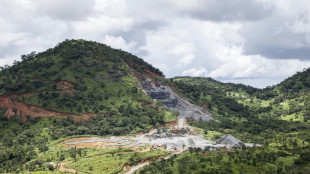 Fanfare as Guinea launches enormous Simandou iron ore mine
Fanfare as Guinea launches enormous Simandou iron ore mine
-
Iraqis vote in general election at crucial regional moment

-
 Shock follows carnage after suicide bombing in Islamabad
Shock follows carnage after suicide bombing in Islamabad
-
Ford returns to pull England strings against All Blacks

-
 Stocks mixed as end to US shutdown appears closer
Stocks mixed as end to US shutdown appears closer
-
BBC must 'fight' for its journalism, outgoing chief says amid Trump lawsuit threat

-
 Atalanta turn to Palladino after Juric sacking
Atalanta turn to Palladino after Juric sacking
-
'Sayyid says': Influential Shiite cleric's supporters boycott Iraq vote

-
 'It's un-British': lawmakers raise concerns about aquarium penguins
'It's un-British': lawmakers raise concerns about aquarium penguins
-
Prosecutor files 142 charges against Istanbul mayor, a top Erdogan critic

-
 Agha hundred lifts Pakistan to 299-5 in 1st Sri Lanka ODI
Agha hundred lifts Pakistan to 299-5 in 1st Sri Lanka ODI
-
German court rules against OpenAI in copyright case

-
 Calls for 'mano dura' as crime-rattled Chile votes for president
Calls for 'mano dura' as crime-rattled Chile votes for president
-
Pakistani Taliban claim deadly suicide attack in Islamabad
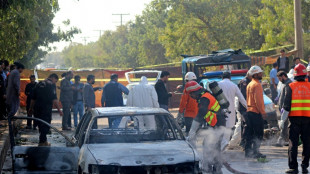
-
 BBC grapples with response to Trump legal threat
BBC grapples with response to Trump legal threat
-
Cristiano Ronaldo says 2026 World Cup 'definitely' his last

-
 Trump says 'we've had a lot of problems' with France
Trump says 'we've had a lot of problems' with France
-
Stocks mostly rise as end to US shutdown appears closer

-
 'Splinternets' threat to be avoided, says web address controller
'Splinternets' threat to be avoided, says web address controller
-
Yamal released from World Cup qualifiers by 'upset' Spanish federation

-
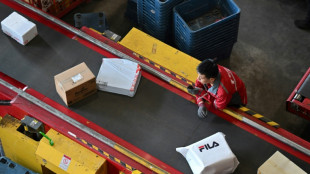 China's 'Singles Day' shopping fest loses its shine for weary consumers
China's 'Singles Day' shopping fest loses its shine for weary consumers
-
Suicide bombing in Islamabad kills 12, wounds 27
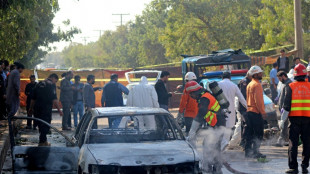
-
 Philippines digs out from Typhoon Fung-wong as death toll climbs
Philippines digs out from Typhoon Fung-wong as death toll climbs
-
Iraqis vote in general election at a crucial regional moment

-
 Asian stocks wobble as US shutdown rally loses steam
Asian stocks wobble as US shutdown rally loses steam
-
UK unemployment jumps to 5% before key govt budget

-
 Japanese 'Ran' actor Tatsuya Nakadai dies at 92
Japanese 'Ran' actor Tatsuya Nakadai dies at 92
-
AI stock boom delivers bumper quarter for Japan's SoftBank

-
 Asian stocks struggle as US shutdown rally loses steam
Asian stocks struggle as US shutdown rally loses steam
-
India probes deadly Delhi blast, vows those responsible will face justice

-
 Pistons win streak hits seven on night of NBA thrillers
Pistons win streak hits seven on night of NBA thrillers
-
US state leaders take stage at UN climate summit -- without Trump
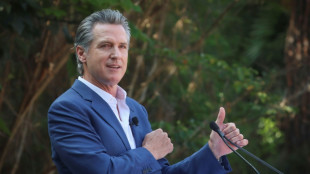
-
 Burger King to enter China joint venture, plans to double stores
Burger King to enter China joint venture, plans to double stores
-
Iraqis vote in general election in rare moment of calm

-
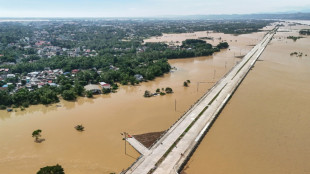 Philippines digs out from Typhoon Fung-wong as death toll climbs to 18
Philippines digs out from Typhoon Fung-wong as death toll climbs to 18
-
'Demon Slayer' helps Sony hike profit forecasts

-
 Who can qualify for 2026 World Cup in next round of European qualifiers
Who can qualify for 2026 World Cup in next round of European qualifiers
-
Ireland's climate battle is being fought in its fields
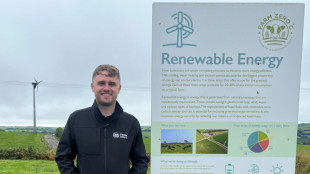
-
 Sony hikes profit forecasts on strong gaming, anime sales
Sony hikes profit forecasts on strong gaming, anime sales
-
End to US government shutdown in sight as stopgap bill advances to House
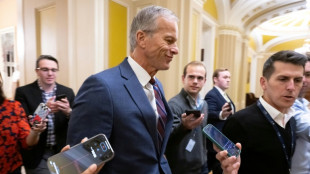
-
 'Western tech dominance fading' at Lisbon's Web Summit
'Western tech dominance fading' at Lisbon's Web Summit
-
Asian stocks rise as record US shutdown nears end

-
 'Joy to beloved motherland': N.Korea football glory fuels propaganda
'Joy to beloved motherland': N.Korea football glory fuels propaganda
-
Taiwan coastguard faces China's might near frontline islands

-
 Concentration of corporate power a 'huge' concern: UN rights chief
Concentration of corporate power a 'huge' concern: UN rights chief
-
Indian forensic teams scour deadly Delhi car explosion


Climate Goals Threatened by Industrialised Animal Farming, Reveals Key International Study
LONDON, UK / ACCESS Newswire / November 11, 2025 / A new study in Animals highlights that industrialized animal farming is one of the most powerful - yet persistently neglected - forces driving the climate and biodiversity crises. The analysis, "The Missing Target: Why Industrialized Animal Farming Must Be at the Core of the Climate Agenda," synthesizes evidence from 47 international studies and concludes that reducing livestock production and embracing plant-based food systems is essential for meeting global climate goals.
Major Insights
Across global research, livestock farming contributes an estimated 12-20% of all greenhouse gas emissions annually, with the most comprehensive studies yielding the highest figures.
The most modern accounting methods, which include the impacts of deforestation, bottom trawling and cooling effects from certain atmospheric pollutants, reveal that 52% of present-day global warming is attributable to animal agriculture.
Animal agriculture occupies over 80% of agricultural land, while providing only 18% of calories and 37% of protein consumed worldwide, making it difficult to meet the needs of a fast-growing future population.
Among other food-originating environmental impacts, the sector also creates 50% of eutrophication and 32% of soil acidification.
Rapidly developing regions including emerging economies are projected to experience the sharpest growth in livestock emissions unless production trends shift.
Biodiversity studies reveal that meat-heavy diets can create three to four times greater biodiversity losses compared to predominantly plant-based diets.
Why a Plant-Based Shift Matters
The analysis makes a compelling environmental case for dietary change. Transitioning toward plant-forward eating patterns would drastically cut greenhouse gas emissions, reduce pressure on forests and freshwater systems, and curb nutrient pollution from feed crops and manure. Such a shift would not only mitigate climate impacts but also help restore ecosystems and safeguard wildlife.
Implications for Policymakers
The authors urge that global climate frameworks-such as climate summits and national plans under the Paris Agreement-must integrate clear targets for reducing animal-product production and consumption. Without tackling this sector, the chances of limiting global warming to well below 2°C (let alone 1.5°C) are significantly compromised.
To be effective and fair, the analysis stresses, solutions must also consider regional realities. In developing economies, dietary transitions should align with food security, cultural preferences, and equitable livelihoods for farmers.
A Turning Point for Food and Climate
"The time is long overdue for greater attention on animal agriculture at key climate and environmental policy-making events such as COP30" stated lead author Jenny Mace. "It would be incredibly difficult to achieve climate and other sustainability targets without a significant downsizing of animal agriculture."
Stated co-author veterinary Professor Andrew Knight, "Industrial livestock farming represents a critical blind spot in global climate policy. However, placing food system reform - particularly the reduction of animal-based products - at the centre of climate action could unlock enormous benefits for both people and the planet."
Co-author Fernanda Vieira of Sinergia Animal commented that, "Industrial-scale farms are a profound driver of biodiversity loss, deforestation, climate change, and the emergence of zoonotic diseases. If we fail to confront these interconnected issues, the prospect of achieving meaningful progress toward our climate, health, and sustainability goals will remain out of reach."
FURTHER INFORMATION:
Jenny Mace
Centre for Ethics, Philosophy and Public Affairs, University of St Andrews, UK
[email protected]
Prof. Andrew Knight
School of Environment and Science, Griffith University, Australia
[email protected]
SOURCE: Sustainable Pet Food Foundation
View the original press release on ACCESS Newswire
B.AbuZeid--SF-PST
